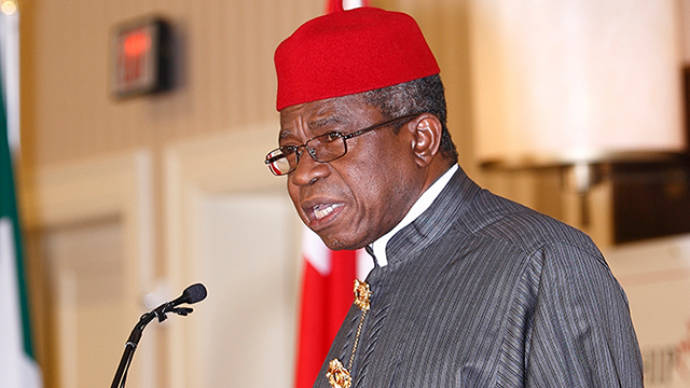By Bolaji Akinola
In my days as an active reporter, Ojo Maduekwe was one of those I always loved to interview. He spoke good English, was a newsmaker and he regularly courted controversy. One could be sure to always get a good quote from him.
Maduekwe was Obasanjo’s second Minister of Transport. He was first appointed Minister of Culture in 1999 while Kema Chikwe got the Transport portfolio but when the President reshuffled his cabinet in 2001, he moved Chikwe to Aviation and Maduekwe to Transport. He was dubbed Minister of Ports because he frequently visited the ports, especially the ones in Lagos. Those were the days when Nigerian Ports Authority was responsible for cargo handling operations. The port was a mess. Vessel queues, congestion, theft, strikes and the rest were regular features of our ports.
Maduekwe once had lunch at the notoriously filthy ‘Any Man Canteen’ in Apapa. The canteen, which, thankfully, has been demolished by NPA, was where many dockworkers and other junior port workers ate. It was a poorly lit, smelly and overcrowded facility, which also served as hangout for many criminal elements. Many commodities stolen from ships were freely traded or hidden in the canteen from where they were smuggled out of the port. I entered the canteen only once and that was about 16 years ago. I couldn’t stand the stench and vowed never to return there. It was big news therefore that Maduekwe, as Minister, decided to have lunch there sometimes in 2001. He went unannounced but a handful of us journalists got whiff of the visit. I suppose he wanted to see what the place looked like, or perhaps he missed buka life.
While he served as Transport Minister, he introduced what he tagged “Operation Zeto” – zero tolerance for corruption, which led to his sack of George Eneh as Director General of the defunct National Maritime Authority (NMA), the forerunner to the Nigerian Maritime Administration and Safety Agency (NIMASA). He also fired Mallam Bello Ibrahim Gwandu, then Managing Director of the Nigerian Ports Authority in 2001, shortly after assuming office.
Maduekwe was responsible for implementing the dock labour reform which ousted Comrade Uzoije Ukuamunna as President-General of the Maritime Workers Union of Nigeria (MWUN). The MWUN under Ukaumunna was a much-dreaded organization. It shut the ports at will and operated with impunity. The entire industry shivered when Ukuamunna sneezed. And he sneezed quite often thus grounding port operations at the slightest provocation. His group also held shipping companies to ransom. Vessels would not discharge except they made certain payments to the union leaders. The dock labour reform was part of a larger reform, which culminated in the port concession of 2006.
Chief Bode George, who was NPA Board Chairman during Maduekwe’s tenure, released a statement last week eulogizing the late Minister but I recall that they were more often than not at each other’s throat over Maduekwe’s alleged interference in the running NPA. Their rivalry was a subject of media attention at the time.
In July 2001, Maduekwe vowed to stop diversion of Nigerian-bound cargoes to the Port of Cotonou. He promised to write official protest letters to the authorities in Benin Republic over the unabated use of Cotonou seaports by Nigerian importers from where goods were smuggled into the country. I am not sure if he wrote the letter, but this goes to show that the diversion of cargoes to these neighbouring ports and smuggling through the land borders did not start today. It has been ever present. One recalls that the Nigerian government under Obasanjo sealed off the country’s 773kilometre border with the Republic of Benin in August 2003 because of criminal activities across the frontier. The closure hit Benin’s economy, pushing up the price of fuel and other imports.
Maduekwe also advocated greater use of bicycles, although critics said the roads were unsafe for cyclists and Maduekwe himself was pushed into a ditch by a bus while cycling to work in Abuja in 2002. He abandoned the bicycle crusade immediately after that incident.
Unfortunately, the late politician and diplomat was not seen as a reformer but as an opportunist by many Nigerians. He was among the political class labeled ‘Agip’ – meaning any government in power. This was so because during the administration of Gen. Sanni Abacha, Maduekwe was among those who campaigned for the dark-goggled general’s transformation to a civilian president. He said on national television that Abacha was the only one that could rule Nigeria effectively. He supported the infamous Youth Earnestly Ask for Abacha (YEAA) campaign, which was formed in 1997 to urge the dictator to self succeed and run for Nigeria’s presidency.
After serving as Transport Minister, he served also as Foreign Affairs Minister under the late President Yar’Adua and as High Commissioner to Canada under Goodluck Jonathan.
I pray his soul finds rest.
Copyright Ships & Ports Ltd. Permission to use quotations from this article is granted subject to appropriate credit given to www.shipsandports.com.ng as the source.

